Unit 11 Smile(微笑)
- 格式:ppt
- 大小:305.00 KB
- 文档页数:2
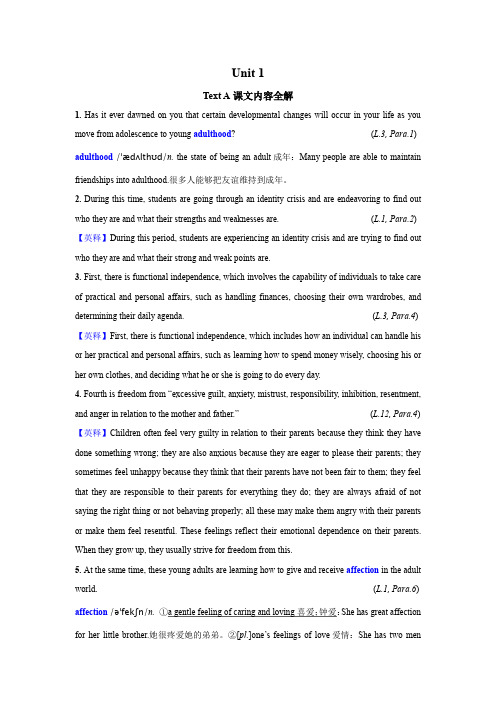
Unit 1Text A课文内容全解1. Has it ever dawned on you that certain developmental changes will occur in your life as you move from adolescence to young adulthood? (L.3, Para.1) adulthood/ˈædʌlthʊd/n. the state of being an adult成年:Many people are able to maintain friendships into adulthood.很多人能够把友谊维持到成年。
2. During this time, students are going through an identity crisis and are endeavoring to find out who they are and what their strengths and weaknesses are. (L.1, Para.2) 【英释】During this period, students are experiencing an identity crisis and are trying to find out who they are and what their strong and weak points are.3. First, there is functional independence, which involves the capability of individuals to take care of practical and personal affairs, such as handling finances, choosing their own wardrobes, and determining their daily agenda. (L.3, Para.4) 【英释】First, there is functional independence, which includes how an individual can handle his or her practical and personal affairs, such as learning how to spend money wisely, choosing his or her own clothes, and deciding what he or she is going to do every day.4. Fourth is freedom from “excessive guilt, anxiety, mistrust, responsibility, inhibition, resentment, and anger in relation to the mother and father.” (L.12, Para.4) 【英释】Children often feel very guilty in relation to their parents because they think they have done something wrong; they are also anxious because they are eager to please their parents; they sometimes feel unhappy because they think that their parents have not been fair to them; they feel that they are responsible to their parents for everything they do; they are always afraid of not saying the right thing or not behaving properly; all these may make them angry with their parents or make them feel resentful. These feelings reflect their emotional dependence on their parents. When they grow up, they usually strive for freedom from this.5. At the same time, these young adults are learning how to give and receive affection in the adult world. (L.1, Para.6) affection/əˈfekʃn/n.①a gentle feeling of caring and loving喜爱;钟爱:She has great affection for her little brother.她很疼爱她的弟弟。

英语35种“笑”burst into laughter 突然大笑crack a smile 展颜微笑,莞尔一笑explode with laughter 哄堂大笑force a smile 强作欢颜burst into gales of laughter 爆发出阵阵笑声grin with delight 高兴的咧嘴而笑a hearty burst of laughter 一阵爽朗的欢笑in stitches 笑不可支laugh at 嘲笑laugh it off 一笑而过laughingstock 笑料;笑柄laugh in the breeze 迎风欢笑laugh oneself to death 差点没笑死laugh people around into a better humour 笑得周围的人心情好起来laugh a hearty laugh 放声大笑,开怀大笑laugh and grow fat 心宽体胖roars of laughter 大笑声a saccharine smile 谄笑,谄媚的笑roll in the aisles 乐不可支,笑得东倒西歪scream with laughter 笑得前仰后合snicker 窃笑snort (讽刺、轻蔑地)高声大笑shriek with laughter 尖声狂笑smile shyly 羞嗒嗒地微笑beam with smiles 笑容满面;笑逐颜开be all smiles 笑容满面, 喜气洋洋toothpaste smile [美口]牙膏广告上露出皓齿的微笑simmer with laughter 忍俊不禁smile on sb. 朝某人微笑smirk 傻笑;假笑smile bitterly 苦笑giggle 咯咯地笑grin 咧嘴而笑grin from ear to ear 嘴咧得大大地笑chuckle 轻声笑;咯咯笑英美人的23种“走”法供稿者:迪零巴? 迪久师?The baby crawled between her father’s legs. 婴儿在她父亲的双腿中间爬。

外研版英语七年级下册Module11课文音频+视频+知识点◆◆◆01Module 11 单词1.bow 鞠躬;弯腰2.kiss 吻;亲吻3. shake(shook) 摇晃4.shake hands 握手5.smile 微笑6.British 英国的;英国人的7.German 德国人;德国的;德语;德语的8.Japanese 日本人;日语;日本的;日语的9.Russian 俄罗斯人(的);俄语(的)10.visitor 游客;观光者11.Russia 俄罗斯12.what 什么(表示惊奇)13.nod 点(头)14.head 头;头部15.hug 拥抱;紧抱16.each 各个;每个17.each other 互相;彼此18.India 印度19.together 一起;共同20.Maori 毛利人的21.touch 触摸;接触22.nose 鼻子23.finger 手指24.foot 脚;足25.knee 膝盖26.leg 腿27.mouth 口28.body 身体,躯干29.foreign 外国的30.North American 北美人31.personal 个人的32.arm in arm 臂挽臂地33.South American 南美人34.hold 握着;使不动35.move 移动36.Britain 不列颠;英国37.not at all 一点也不38.polite 礼貌的39.somewhere 某处;某地40.wave 挥(手);招(手)41.fact 事实;细节42.in fact 事实上43.rude 粗鲁的;无礼的44.bring 带来02Module 11课文动画外研版七年级下册Module 11 Unit 1 课文动画外研版七年级下册Module 11 Unit 2 课文动画03Module11知识梳理【重点短语】1. body language 肢体语言3. nod head 点头4. best friend 最好的朋友5. shake hands 握手6. each other 互相8. foreign students 外国学生9. in fact 事实上7. stand close to 站得离......近8. be late for class 上课迟到9. move away 离开,搬走10. class rules 班规11. listen to 听12. stand in line 站成一排13. enter the lab alone 独自进入实验室14. on time 准时,按时【重点句型】1. I’m welcoming th e visitors.我要去迎接这些参观者。
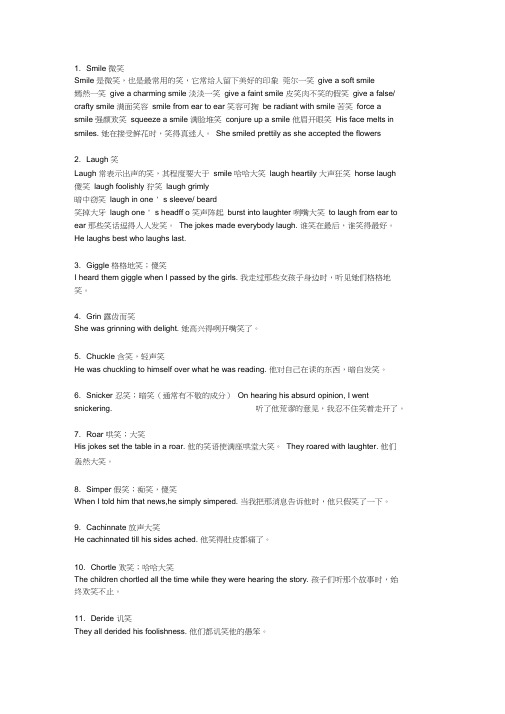
1. Smile 微笑Smile 是微笑,也是最常用的笑,它常给人留下美好的印象莞尔一笑give a soft smile嫣然一笑give a charming smile 淡淡一笑give a faint smile 皮笑肉不笑的假笑give a false/ crafty smile 满面笑容smile from ear to ear 笑容可掬be radiant with smile 苦笑force a smile 强颜欢笑squeeze a smile 满脸堆笑conjure up a smile 他眉开眼笑His face melts in smiles. 她在接受鲜花时,笑得真迷人。
She smiled prettily as she accepted the flowers2. Laugh 笑Laugh 常表示出声的笑,其程度要大于smile 哈哈大笑laugh heartily 大声狂笑horse laugh 傻笑laugh foolishly 狞笑laugh grimly暗中窃笑laugh in one ' s sleeve/ beard笑掉大牙laugh one ' s headff o 笑声阵起burst into laughter 咧嘴大笑to laugh from ear to ear 那些笑话逗得人人发笑。
The jokes made everybody laugh. 谁笑在最后,谁笑得最好。
He laughs best who laughs last.3. Giggle 格格地笑;傻笑I heard them giggle when I passed by the girls. 我走过那些女孩子身边时,听见她们格格地笑。
4. Grin 露齿而笑She was grinning with delight. 她高兴得咧开嘴笑了。
5. Chuckle 含笑,轻声笑He was chuckling to himself over what he was reading. 他对自己在读的东西,暗自发笑。
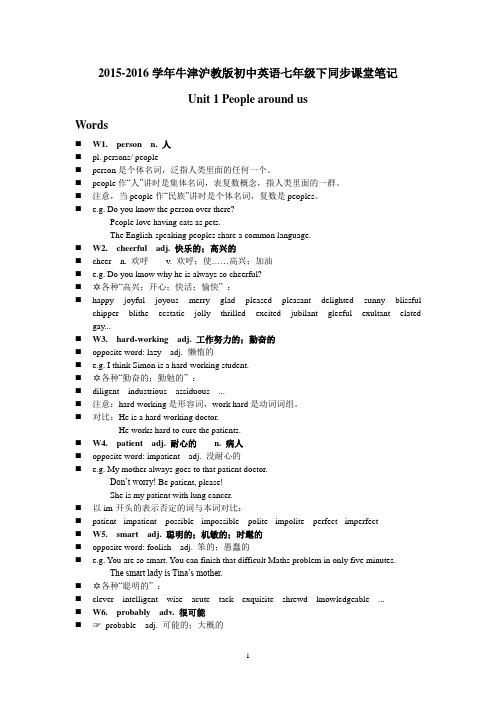
2015-2016学年牛津沪教版初中英语七年级下同步课堂笔记Unit 1 People around usWords⏹W1. person n. 人⏹pl. persons/ people⏹person是个体名词,泛指人类里面的任何一个。
⏹people作“人”讲时是集体名词,表复数概念,指人类里面的一群。
⏹注意,当people作“民族”讲时是个体名词,复数是peoples。
⏹ e.g. Do you know the person over there?People love having cats as pets.The English-speaking peoples share a common language.⏹W2. cheerful adj. 快乐的;高兴的⏹cheer n. 欢呼v. 欢呼;使……高兴;加油⏹ e.g. Do you know why he is always so cheerful?⏹✲各种“高兴;开心;快活;愉快” :⏹happy joyful joyous merry glad pleased pleasant delighted sunny blissfulchipper blithe ecstatic jolly thrilled excited jubilant gleeful exultant elated gay...⏹W3. hard-working adj. 工作努力的;勤奋的⏹opposite word: lazy adj. 懒惰的⏹ e.g. I think Simon is a hard-working student.⏹✲各种“勤奋的;勤勉的” :⏹diligent industrious assiduous ...⏹注意:hard-working是形容词,work hard是动词词组。
⏹对比:He is a hard-working doctor.He works hard to cure the patients.⏹W4. patient adj. 耐心的n. 病人⏹opposite word: impatient adj. 没耐心的⏹ e.g. My mother always goes to that patient doctor.Don‟t worry! Be patient, please!She is my patient with lung cancer.⏹以im-开头的表示否定的词与本词对比:⏹patient - impatient possible - impossible polite - impolite perfect - imperfect⏹W5. smart adj. 聪明的;机敏的;时髦的⏹opposite word: foolish adj. 笨的;愚蠢的⏹ e.g. You are so smart. You can finish that difficult Maths problem in only five minutes.The smart lady is Tina‟s mother.⏹✲各种“聪明的” :⏹clever intelligent wise acute tack exquisite shrewd knowledgeable ...⏹W6. probably adv. 很可能⏹☞probable adj. 可能的;大概的⏹ e.g. You are probably right.It was probably her most popular song.⏹✲各种“很可能;或许;也许” :⏹maybe likely perhaps possibly ...⏹W7. forget v. 忘记⏹☞forget - forgetting forget - forgot - forgotten⏹opposite word: remember v. 记得⏹☃玩转forget:⏹forget后接人或事、物,表示“忘记某人/某事/某物”:⏹ e.g. He forgot the name of his primary school class teacher.⏹forget后接to do sth表示“忘记去做某事(还没做)”(forget to do sth):⏹ e.g. Don‟t forget to reply to Jane in the morning.⏹forget后接doing sth表示“忘记做过某事(做完了)”(forget doing sth):⏹ e.g. He forgot buying that scarf in Paris.⏹☃玩转remember:⏹remember后接人或事、物,表示“记得某人/某事/某物”:⏹ e.g. Mary remembered her middle school English teacher.⏹remember后接to do sth表示“记得去做某事(还没做)”⏹(remember to do sth):⏹ e.g. You should remember to reply to Jane in the morning.⏹remember后接doing sth表示“忘记做过某事(做完了)”⏹(remember doing sth):⏹ e.g. I remember seeing the man somewhere.⏹W8. smell n. 气味v. 闻;嗅⏹ e.g. Many people don‟t like the smell of durians.⏹☃玩转smell(作动词):⏹(1)smell作行为动词时,后面直接跟宾语:⏹ e.g. Smell the perfume. Do you like it?⏹(2)smell作系动词时,后接形容词来修饰主语:⏹ e.g. The meat smells nice, but tastes terrible.⏹✲各种系动词:⏹be [am, is, are](状态系动词);keep, rest, remain, stay, lie, stand(持续系动词);seem, appear,look(表象系动词);feel, sound, smell, taste(感官系动词);become, grow, turn, fall, get, go, come, run(变化系动词);prove, turn out(终止系动词)...⏹W9. care n. 照顾v. 关心;关注;在乎⏹ e.g. Baby dogs and cats need a lot of care.⏹The only thing he cares about is money.⏹☃玩转care:⏹careful adj. 仔细的;小心的careless adj. 粗心的;漫不经心的carefully adv. 仔细地;小心地carelessly adv. 粗心地;草率地carefulness n. 仔细;慎重carelessness n. 粗心大意;草率⏹✲各种care:⏹(1)care about sth 担心/在乎某事 e.g. She doesn‟t care about money.⏹(2)take care of sb 照顾某人 e.g. I‟ll take care of myself.⏹(3)care for sb 照顾某人(病人) e.g. She cared for her father in his dying year.⏹(4)care for sth 想要某物 e.g. Would you care for a drink?⏹(5)care to do sth 愿意做某事(用于礼貌性话语)= be willing to do sthe.g. Would you care to wait here, sir?⏹W10. miss v. 想念,怀念;错过;过失n. 小姐;女士(用于未婚的女性,放在姓之前,要大写)⏹ e.g. I miss my classmates in my primary school.⏹He missed the ball.⏹Are you Miss Huang?⏹W11. joke n. 玩笑v. 说笑话;开玩笑⏹ e.g. He is full of fun. He always tell jokes to make us laugh.⏹I didn‟t get the joke.⏹They are laughing and joking together.⏹☃玩转joke:⏹play a joke on sb 开某人玩笑have a joke 说笑话;开玩笑⏹Are you joking (me)? = Are you kidding (me)? 你在(和我)开玩笑吗?⏹W12. laugh v. 玩笑⏹☞laughter n. 笑;笑声⏹注意:laugh中的的gh发/ f /音。
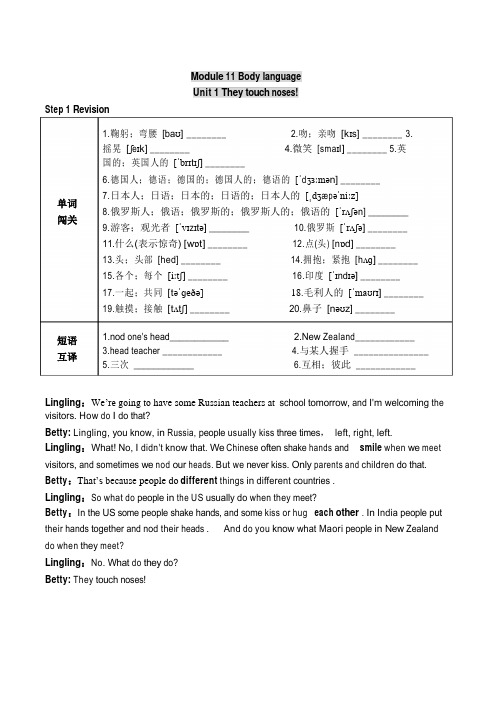
Module11Body languageUnit1 They touch noses!Step1Revision1.鞠躬;弯腰[baʊ]________2.吻;亲吻[kɪs]________3.摇晃[ʃeɪk]________ 4.微笑[smaɪl]________5.英国的;英国人的[ˈbrɪtɪʃ]________6.德国人;德语;德国的;德国人的;德语的[ˈdʒɜːmən]________单词闯关短语互译7.日本人;日语;日本的;日语的;日本人的[ˌdʒæpəˈniːz]________8.俄罗斯人;俄语;俄罗斯的;俄罗斯人的;俄语的[ˈrʌʃən]________9.游客;观光者[ˈvɪzɪtə]________10.俄罗斯[ˈrʌʃə]________ 11.什么(表示惊奇)[wɒt]________12.点(头)[nɒd]________13.头;头部[hed] ________14.拥抱;紧抱[hʌɡ]________ 15.各个;每个[iːtʃ]________16.印度[ˈɪndɪə]________17.一起;共同[təˈɡeðə]________ 18.毛利人的[ˈmaʊrɪ]________ 19.触摸;接触[tʌtʃ]________20.鼻子[nəʊz]________1.nod one's head____________2.New Zealand____________3.head teacher____________4.与某人握手_______________5.三次____________6.互相;彼此____________Lingling:We’re going to have some Russian teachers at school tomorrow,and I'm welcoming the visitors.How do I do that?Betty:Lingling,you know,in Russia,people usually kiss three times,left,right,left. Lingling:What!No,I didn't know that.We Chinese often shake hands and smile when we meet visitors,and sometimes we nod our heads. But we never kiss.Only parents and children do that. Betty:That’s because people do different things in different countries.Lingling:So what do people in the US usually do when they meet?Betty:I n the US some people shake hands,and some kiss or hug each other. In India people puttheir hands together and nod their heads .And do you know what Maori people in New Zealanddo when they meet?Lingling:No.What do they do?Betty:They touch noses!Step2Language points1.smile n.&v.微笑例:She welcomed us with a smile.她微笑着欢迎我们。
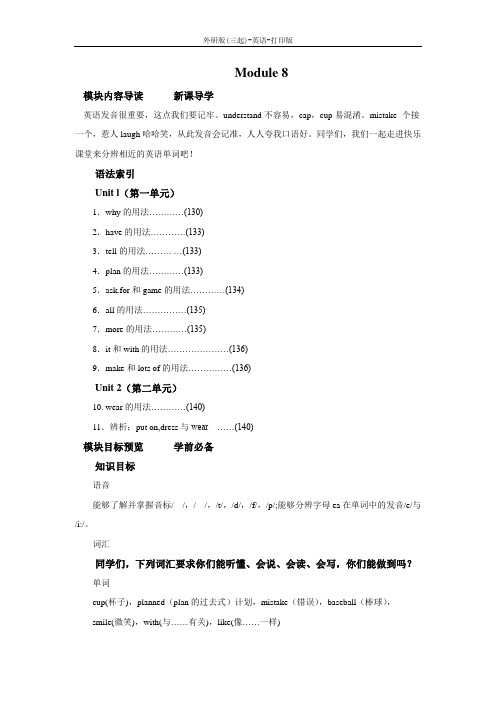
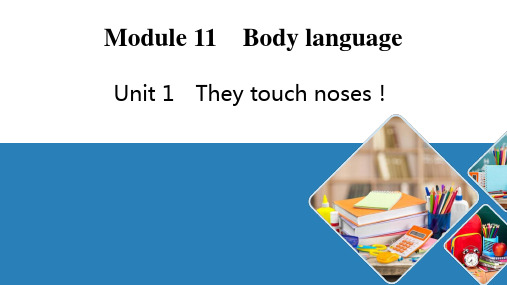

外研版七下M11U1笔记详解,巩固练习及重点语法Unit1笔记详解1. We’re going to have some Russian teachers at school tomorrow,and I’m welcoming the visitors.明天我们学校会有一些俄罗斯老师来,我要去迎接他们。
(1) Russian 此处用作形容词,“俄罗斯的”。
Russian 还可作名词,意为“俄语,俄罗斯人”,“俄语”不可数,“俄罗斯人”可数,复数Russians。
另外,国名“俄罗斯”是Russia。
【拓展】常见国家的国名、国人、国语及重要城市,见下面表格。
注意表示国人的名词这列,除了“Englishman/Frenchman”和“New Zealander”只能做名词,其他的还可以做形容词,表示“某国家的,某国人的”,形容词常用在be动词后做表语或者名词前做定语。
表达“英国的,英国人的(统称)”用British这个形容词。
请同学们特别注意观察国人的复数变化形式:中日不变英法变,其他加s。
中国人和日本人Chinese和Japanese单复同形,英国人和法国人Englishman/Frenchman的复数形式是Englishmen/ Frenchmen,其他国人变复数加s。
(2)I’m welcoming the visitors. 这句话是现在进行时表将来。
即表面形式是现在进行时,但是表达的是一般将来时的意思,和and并列句的前半句be going to将来时的时态一致。
2. …in Russia,people usually kiss three times …time 此处用作可数名词,意为“次数”,three times意为“三次”。
在英语中,“一次”用once, “两次”用twice, 三次及三次以上用“基数词+times”。
Take this medicine three times a day。
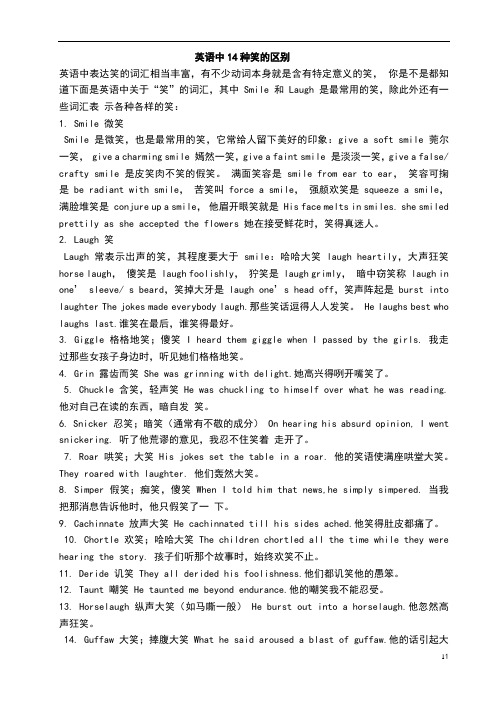
英语中14种笑的区别英语中表达笑的词汇相当丰富,有不少动词本身就是含有特定意义的笑,你是不是都知道下面是英语中关于“笑”的词汇,其中 Smile 和 Laugh 是最常用的笑,除此外还有一些词汇表示各种各样的笑:1. Smile 微笑Smile 是微笑,也是最常用的笑,它常给人留下美好的印象:give a soft smile 莞尔一笑, give a charming smile 嫣然一笑,give a faint smile 是淡淡一笑,give a false/ crafty smile 是皮笑肉不笑的假笑。
满面笑容是 smile from ear to ear,笑容可掬是 be radiant with smile,苦笑叫 force a smile,强颜欢笑是 squeeze a smile,满脸堆笑是 conjure up a smile,他眉开眼笑就是 His face melts in smiles. she smiled prettily as she accepted the flowers 她在接受鲜花时,笑得真迷人。
2. Laugh 笑Laugh 常表示出声的笑,其程度要大于 smile:哈哈大笑 laugh heartily,大声狂笑horse laugh,傻笑是 laugh foolishly,狞笑是 laugh grimly,暗中窃笑称 laugh in one’ sleeve/ s beard,笑掉大牙是laugh one’s head off,笑声阵起是 burst into laughter The jokes made everybody laugh.那些笑话逗得人人发笑。
He laughs best who laughs last.谁笑在最后,谁笑得最好。
3. Giggle 格格地笑;傻笑 I heard them giggle when I passed by the girls. 我走过那些女孩子身边时,听见她们格格地笑。

人教版九年级全一册Unit 11 单元过关测试卷(739)1.(wa it)fo r he r fo r s uc h a lon g time ma d e me r ea lly a n g r y.2.I f e e l a h ea v y (we ig h) o n my s h o u ld er s th e s e d a ys.3.“Lif e is ju s t lik e a mir r o r.You s mile a t it,a nd it s mile s a t yo u,to o.”请你以“Le a r n to S mile”为题,根据下表所列的要点写一篇100词左右的文章(文章开头已给出,不计1.参考词汇:s mile a t s b.对某人微笑mis u n d e r s ta nd误解[[/p p]]2.短文必须包括所有内容要点,不要逐字翻译,可适当发挥,使短文连贯通顺。
Le a r n to S mileI r e me mb e r a so ng b y We s tlif e;th e f ir s t se nte n c e o f it is “J u s t a s mile an d th e r a in is g o ne.”D o yo u lik e s milin g I th in k yo u s ho u ld lea r n to s mile.4.D iff e r e n t we a the r ma k e s p eo p le f e e l d iff er e n t.It h a s a n e ff e ct o n h e a lth,in te llig e n ce(智力)and f e e ling s.In A u gu s t,it is ve r y h o t a nd we t in th e s ou th e r n p a r t o f th e U n ited S ta te s.P eo p le th e r e h a ve he a r t tro u b le an d o th e r k ind s o f h e a lth pr o b le ms du r in g th is mon th.In the No r th e rn a n d th e M id d le We s t,it is ve r y h o t a t so me time s a n d ve r y c o ld a t o th e r time s.P eo p le in th e se s ta te s h a ve mo r e he a r t tro u b le a f te r th e wea th e r c ha ng e s in Fe b r u a r y o r M a r ch.T h e wea th e r c an a ls o in f lu e nc e p eo p le's in te llig e n ce.Fo r e xa mp le,in a 1983 r ep o r t b y s c ie n tis ts,th e IQ(智商) o f a g r ou p o f s tu d en ts was ve r y h ig h wh e n a ve r y s tr o n g win d c a me,b u t a f te r the str o n g win d,th e ir IQ wa s 10\% lo we r.The wind ca n he lp p eo p le h a ve mo r e in te llige n ce.Ve r y h o t we a the r,o n th e o th er ha n d,c an ma k e i tlo we r.S tu de n ts in ma n y s c h o o ls o f th e Un ite d S ta te s o f ten ge t wor s e in ex a ms in th e h o tmo n th s o f th e ye a r(J ul y a n d A ug u s t).T h e we a th e r a ls o h a s a s tr o ng in f lu e nc e o n pe o p le's f e e lin gs.Win te r ma y b e a ba d time f o r th in p eo p le.Th ey u s u a lly f e e l c o ld d u rin g t h e s e mo n ths.Th e y mig h t f e e l u nh ap py d u r ing co ld wea th e r.Bu t f a t p eo p le ma y h a ve a ha r d time in h o t s u mme r.A t ab ou t 18^\c ir c{\ma th r m{C}},p eo p le f e e l mo r e c o mf o r ta b le.A r e yo u f e e lin g s a d,tir e d o r u n ha pp y to d a y?It ma y b e th e wea th e r's p r o b le m.(1)Be s id e s f e e ling s,h o w ma n y s id e s d oe s th is pa s s ag e me n tio n a b ou t th e we a the r'sin f lu e nc e o n p e op le()A.Five.B.Fo u r.C.T h re e.D.Two.(2)W ha t do e s th e u nd er lin e d wo r d “it”r e fe r to in P a r ag r a ph 3?()A.He a lth.B.Wind.C.IQ.D.We a th e r.(3)W ha t's th e ma in ide a o f th is p a s s ag e?()A.D iff e r en t ch a ng e s of we a the r.B.A t a b ou t 18^\c ir c{\ma th r m{C}},p eo p le f e e l mo r e c o mf o r ta ble.C.T he we a th e r in f lu enc e s s tud en ts' in te llig e n c e.D.T he wea th e r in f lu enc e s pe op le's h e a lth,in te llig e n ce an d f e e lin g s.(4)W h y d o s tu de n ts in ma n y s c h o o ls in th e U nite d S ta te s u s ua lly g e t wo r s e in ex a ms in J u lya n d Au g us t()A.B ec a us e a ve r y s tr o n g wind ca me th e n.B.B ec a u se the wea th er is ve r y h o t.C.B ec a u se the y d o n't d o we ll in the ir s tud ies.D.B ec a us e the y h a ve lo w IQ.(5)In wh ic h s e c tion o f th e n e ws pa p e r c an yo u p ro b ab ly r e a d th is pa s s a ge()A.S to r y.B.N e ws.C.D is co ve r y.D.Ad ve r tis e me n t.5.H a ve yo u e ve r wa lk ed in to a r oo m a n d f e lt r e la x ed It c o u ld be be c a us e the wa lls we re p a in ted b lu e, a ca lm a n d p e ac e f u l c o lo r.S o me time s c o lo r s ca n a ff e c t ou r f e e ling s a nd mo o d s.S o me c o lo rs c an ma k e us f ee l c a lm a n d p ea c e fu l.B lu e is o ne o f th e se.We a rin g b lu e c lo the s o r s lee p in g in a b lu e ro o m is g o od f o r ou r min d an d b od y,b e c a u s e th is c olo r ma k e s a go o d f e e lin g.B lue is a ls o th e c o lo r o f s ad n es s, s o yo u ma y s a y yo u'r e f e e lin g b lue wh e n yo u a re fe e lin g s ad.W h ite is a n o the r c a lm c o lo r.You s h ou ld wea r wh ite c lo th e s if yo u a r e f ee lin g n e r vou s.W h iteis a ls o th e co lo r o f p ur it y(纯洁).M a n y wo me n lik e to be in wh ite o n th e ir we d d in gd a y.G re en is th e c o lo r of n a tu r e.It ca ng ive u s mo r e e n e rg y wh en we a r e f e e ling tir e d.S o me co lo r s ca n ma k e yo u f e e l wa r m.T he s e c o lo r s c an g ive yo u a ha p p y f e e ling.P e op le wh o live in co ld c lima te s us e wa r m co lo r s in th e ir ho u se s lik e o ra ng e a nd ye llo w in s te a d o f wh ite a nd b lu e.O r an g e s ho ws jo y.It c a n b r ing yo u s u cc e ss a nd ch e e r yo u u p whe n yo u a r e f e e lings a d.Ye llo w is th e colo r o f th e su n, s o it c an r e min d yo u o f a wa rm, s u n n y d a y.Ye llow is a ls o th e co lo r o f wis d o m.S o me p e op le p r e f e r th is co lo r wh e n th e y s tu d y f o re x a ms.Fo r e x a mp le,th e y ma y u s e ye llo w s c ho o l th in g s.Re d is o n e of th e s tro ngc o lo r s.We a r ing r ed o f te n ma k es u s a c tive.In s h o r t,we c an tr y o u t d iff e r en t c o lo r s if we a r en't f e e lin g a t o ur b e s t.(1)Ac c or d ing to th e p as s a g e, wh ic h co lo r o f th e fo llo wing c a n ma k e yo u f e e l r e la x ed?()A.Ye llo w.B.O r an ge.C.R ed.D.W h ite.(2)W ha t's th e me a n in g o f the s en te nc e “Sh e is b lu e to da y.”?()A.S h e is an g r y to d a y.B.S h e is s ad tod a y.C.S h e is bo r e d to da y.D.S h e is ex c ited tod ay.(3)S o me s tud en ts p re fe r ye llo w r u le r s o r e r as e r s whe n th e y s tu d y f o r e xa ms,b ec a u seye l lo w is th e c o lo r o f.()A.wisd o mB.pu r ityC.na tu r eD.p e ac e(4)Ac c or d ing to th e pa s s a ge,wh ic h o f the fo llo win g is NO T tru e?()A.P e op le wh o live in c o ld c lima te s h a d be tte r p a in t th e wa lls of th e ir ho u se s wh ite.B.Ma n y wo me n lik e to b e in wh ite o n th e ir we d d ing d a y b e c au s e it's th e c o lo r o f pu r ity.C.S o me time s c o lo r s ca n a ff ec t ou r f ee lin g s a n d mo od s.D.We ar in g g r ee n c a n g ive u s mo r e e n e rg y wh e n we a re f ee lin g tire d.(5)Is r e d a s tr o ng co lor o r a p ea c e fu l co lo r?()A.Ye s,it is.B.N o,it is n't.C.A p e ac e f u l c o lo r.D.A s tro ng co lo r.6.H a ve yo u e ve r ha d th e f ee lin g th a t n o o ne c a n u nd e r s ta n d yo u?We ll,he r e co me s “P ep p e r”,a nd it co u ld b e a bo u t to ch a ng e a ll th a t.P e pp e r is th e f ir s t r ob o t to r e ad h u ma n f e e lin g s.U s ing its emo tio n r e c og n ition f un c tio n s(情感识别功能),P ep p e r c an ma ke jo k e s,d an c e a nd e ve n s ing to p eo p le wh en th e y a r e a ro un d it.T h e ro b o t loo k s lik e a lo ve l y g ir l.It is f ou r fe e t ta ll with a ta b le t c omp u te r in its c he s t.Ith a s h u ma n-lik e h an d s,a g ir l-lik e b o d y a nd b ab y-lik e vo ic e.It wa s s ho wn to a ttr ac t p e op le a t s to r e s o n Fr id a y.P e pp e r c a n te ll f a c ia l e x p re s s io ns,hu ma n vo ic e s a nd s ig n s,the n ma k e a na n s we r.P ep pe r is de s ig n ed to be a f a mil y r o bo t,bu t it isn't li k e the h o u se ho ld ro bot in th e c a r too n.P e p pe r is u se d a t ho me o r s to r e s,wh e r e we e njo y p le a s u r e an de n te r ta in me n t.A t h o me,n o t on ly c a n it te ll jo k e s,b u t it c a n a lso h e lp p e op le in tr o u b le.If a n a tu r a l a c c ide n t h a pp e ns,it c a n e nc ou r a ge th e m,ma ke the m la u g h an d f ee l r e lax ed.(1)(2)(3)(4)(5)N ob od y c a n b e h a pp y a ll th e time.Yo u ma y b e c o me u nh ap p y s o me time s,fo r e x a mp le,wh e n yo u f a il a n e x am, 1.yo u ma y b e c o me s ad whe n yo u lo s e o n e o f yo u rf r ie n d s.It's n o r ma l to h a ve th e s e f e e ling s.If yo u d on't k n o w wh a t to d o with th es e p r o b le ms,yo u ma y l e a r n2.f ro m J e ff.J e ff a lmo s t wen t 3.wh en h is b r o th e r w a s k ille d in a c a r a cc id en t.He 4.to g o ou to r ta lk to an yb o d y,eve n h is p a r en ts.H e wa s qu ite an g r y 5.th e d r ive r be c au s e h is c a r h it h is b ro th e r,eve n th ou g h it wa s a(n) 6..A f te r s e ve r al mo n th s,J e ff b e ga n to un de r s ta nd it wa s u se le s s to b e an g r y.N ow h e 7.mis s e s h is b r o th e r,b u t he d oe s n't8.th e d r ive r an y l o n ge r.H e b eg in s to ta lk to h is p a r en ts an d th a t ma k e s th e m h ap pya g a in.H e n o lo ng e r 9.in h is ro o mb y h ims e lf.In s te a d,he go e s to the 10.or p la ys s p o r ts with h is fr ie n d s.H e is fe e ling b e tte r no w.(1)(2)(3)(4)(5)(6)(7)(8)(9)(10)8.I h a ve ma n y f r ie n d s a n d I th ink(友谊)is th e mo s t imp o r tant th in g in my lif e.9.I th in k th a t he a lth is mo r e imp o r ta n t tha n (财富).10.I'm s o r r y to(使失望) yo u,b u t I'm a f r a id I c a n't g o to yo u r b ir th d a y p a r t y.11.T he b o ys we r e(踢)a b a ll a r o un d in th e ya r d.12.M y te a c he r's wo r d s g ive me(勇气).13.H e we n t to H o llywo o d in se a r ch o f (f a mo u s)a nd fo r tu ne.14.H e f e lt (c o mf o r ta b le) b ec a u se o f pos s ib le da ng e r o r tr ou ble.15.You r ide a is g r ea t.I'm in(a g r ee) with yo u.16.T he pe a ce f u l mu s ic o f the CD ma d e th e stu d e n ts re la x ed.()A.fe e lB.f ee lsC.f e ltD.to f e e l17.H e on ly wa ite d f o r two min u te s b e f o re he wa s to se e th e d o c to r.()A.c a lle d a tB.ca lle d inC.ca lle d o u tD.c a lle d o n18.To m do e s n't wa n t to h is pa r e n ts ,s o h e a lwa ys wo r k s ha r d.()A.le t; d o wnB.go; do wnC.ke ep; do wnD.p u t; do wn19.S h e wo u ld r a th e r s wimmin g to mo r r o w th a n b as k e tb a ll.()A.to go; p la yB.go ing; p la yin gC.go; to p la yD.g o; p la y20.—I f e e l s tr e s se d fro m time to time.Cou ld yo u g ive me s o me a d vic e?—s ha r e yo u r wo rr ie s with yo u r p a re n ts()A.W h y d o n't yo uB.H o w a bo u tC.W h a t a bo u tD.Wou ld yo u lik e21.—H u r r y u p! Th e r e's a bu s c o min g!—Wh y r u n Th e r e will b e an o the r on e two o r th re e min u te s.()A.b yB.inC.fo rD.with22.yo u wo rk, p ro g re s s yo u will ma k e.()A.Ha r d e r; g r ea te rB.T he ha r d e r; th e g r ea te rC.H a rd e r; th e g r e a te rD.T he ha r d er; g r ea te r23.I mis s e d the G r ea t Wa ll b e ca u se o f th e b a d we a the r.()A.vis itB.vis itsC.vis itin gD.to vis it24.H e s pe a k s E ng lis h Fr e n c h.In ste a d, h e s p ea k s Ge r ma n.()A.e ith e r; o rB.no t on ly; b u t a ls oC.bo th; a n dD.n e ith e r; n o r25.M y b r o the r wa s r e ad in g a bo ok I c ame in.()A.a sB.s inc eC.be c au s eD.th o ug h26.Lis te n!I h e a r so me o n e in th e c la s sr o o m.()A.s in gB.s ing ingC.to s in gD.sa ng27.—I d id n't e n jo y my s e lf a t the pa r ty.I ju s t f e lt .—We ll,ma yb e th e r e we r e too ma n y p e o p le a t the pa r ty.()A.g ive n ou tB.tr ied ou tC.le f t o u tD.c u t o u t28.my s u r p r is e,h e d idn't wo r r y a b o ut th e e xa m a t a ll.()A.To; f a ilB.A t; f a ilingC.To; fa ilin gD.In; f a il29.—M y p a r e n ts a r e so me time s to o h a rd me.—A r e th e y T h e y ju s t wa n t yo u to sp e nd mo r e time yo u r le s s o n s.()A.o n; o nB.on; withC.with; o nD.with; with30.If we co n tinu e to,we a r e su r e to be a t th e m ne x t time.()A.p u ll tog e the rB.g ive u pC.le t d o wnD.k ic k o ff31.I s a t do wn to r e ad un d e r an o ld tr e e in the p a r k.I f e lt my lif e wa s 1 , f o r my wh o le wo r ld wa s d a rk. A yo u ng bo y r a n u p to me, o u t o f 2 .H e s too d r igh t b e fo r e me with h is he ad d o wn an d s a id 3, “Lo o k wh a t I'v e f ou nd!” In h is ha n d wa s a f lo we r, an d wha t a p oo r s igh t! Th e f lo we r wa s d r y a n d 4 .I g a ve h im a s ma ll s mile a n d th en tu r ne d m ye ye s a wa y s o th a t h e co u ld ta k e h is d r yf lo we r a nd go o ff to p la y.5 , h e s a t n ex t to my s id e a n d p lac e d the f lo we r to h is 6a n d sa id in s u rp r is e, “Its me lls s we e t a nd it's be a u tif u l, too.T ha t's7I p ick ed it.H e re, it's f o r yo u.” Th e f lo we r b e fo r e me wa s d e a d.B u t I k n e w I mu s t 8 it, o r h e mig h t n e ve r le a ve.S o I a c c e p te d th e f lo we r, a n d r ep lie d, “Th is is jus t wh a t I 9.” J u st th en, f o r th e f ir s t time,I n o tic e d tha t the bo y c o u ld no t 10, be ca u s e h e wa s b lin d.Te a rs ca me do wn my f a c e a s I 11h im fo r p ic k ing the b e s t o ne.“You'r e we lc o me,”h e s mile d a nd th en ra n o ff to12.I s a t th e r e a nd wo nd e r ed h ow h e wa s ab le to le a rn a b ou t my p a in.T h rou g h the e ye s o f a b lin d c h ild, 13I c o u ld s e e th e p r o b le m wa sn o t with th e wo r ld; the p r ob le m wa s me.A nd fo r a ll tho s e ye a r s I mys e lf h a db e e n 14.I d ec ide d to s ee the be a u ty in lif e, a n d 15 e ve r y s e c o n d o f mylif e.A nd th e n I he ld th a t d r y f lo we r u p to my n o s e a n d br e a the d in th e s m e ll o f a b ea u tif u l r o s e.(1)A.h o pe le s sB.co lo r fu lC.s imp leD.wo n de r f u l(2)A.min dB.tr ou b leC.wo rkD.b r e a th(3)A.sa d lyB.ex c ited lyC.an g r ilyD.s tr ic tly(4)A.f re s hB.de adC.a liveD.h e a vy(5)A.S oB.O rC.H o we ve rD.An d(6)A.n o seB.he adC.ea rD.e ye s(7)A.h o wB.whe nC.wh yD.wh e r e(8)A.b u yB.r ec e iveC.br e akD.a c ce p t(9)A.wa n tB.d is lik eC.ad mir eD.h a ve(10)A.c r yB.sp e akC.s mileD.se e(11)A.fo rg a veB.tha nk e dC.pa idD.h a ted(12)A.s le e pB.s tud yC.p la yD.d a nc e(13)A.a t mo s tB.a t time sC.a t f ir s tD.a t la s t(14)A.b lin d e f u lC.ch e er f u lD.d e a f(15)A.wa s teB.fo rg e tC.lo seD.e n jo y参考答案1.【答案】:Waiting2.【答案】:weight3.【答案】:One possible version:Learn to SmileI remember a song by Westlife;the first sentence of it is “Justa smile and the rain is gone.”Do you like smiling?I think you should learn to smile.First,learn to smile at yourself when something unpleasant happens in your life.If you fail an exam or you are misunderstood by your friends,don't be sad.Just smile at yourself.Smiling at yourself brings back your confidence.Sometimes the one who beats you is not others,but yourself.And smile can also keep you healthy.Second,learn to smile at others.It will make you communicate better with people.Smiling at others makes you happy as well.In a word,smile is a kind of language belonging to everyone.It passes love and friendship and helps shorten the distance between you and other people.Living with a smile,every day will be shiny.4(1)【答案】D(2)【答案】C(3)【答案】D(4)【答案】B(5)【答案】C5(1)【答案】D(2)【答案】B(3)【答案】A(4)【答案】A(5)【答案】D6(1)【答案】human feelings(2)【答案】tablet computer(3)【答案】home or stores(4)【答案】facial expressions(5)【答案】in trouble7(1)【答案】or(2)【答案】something(3)【答案】mad(4)【答案】refused(5)【答案】with(6)【答案】accident(7)【答案】still(8)【答案】hate(9)【答案】stays(10)【答案】movies8.【答案】:friendship9.【答案】:wealth10.【答案】:disappoint11.【答案】:kicking12.【答案】:courage13.【答案】:fame14.【答案】:uncomfortable15.【答案】:agreement16.【答案】:A18.【答案】:A19.【答案】:D20.【答案】:A21.【答案】:B22.【答案】:B23.【答案】:C24.【答案】:D【解析】:either...or或者......或者;not only...but also不但……而且;both...and两者都;neither...nor既不……也不。
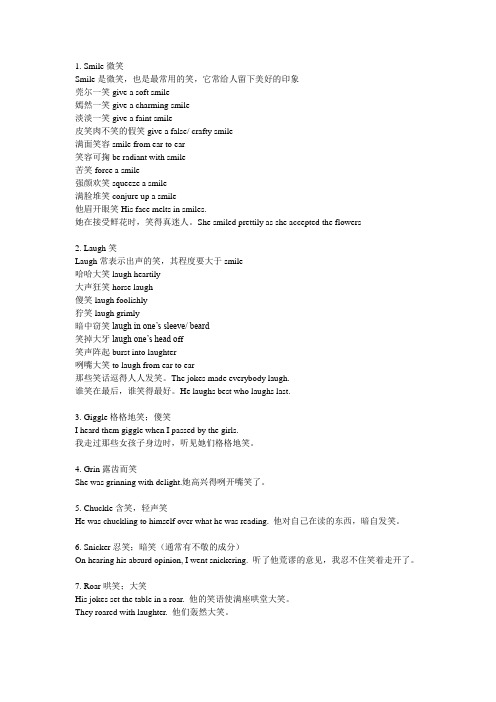
1. Smile微笑Smile是微笑,也是最常用的笑,它常给人留下美好的印象莞尔一笑give a soft smile嫣然一笑give a charming smile淡淡一笑give a faint smile皮笑肉不笑的假笑give a false/ crafty smile满面笑容smile from ear to ear笑容可掬be radiant with smile苦笑force a smile强颜欢笑squeeze a smile满脸堆笑conjure up a smile他眉开眼笑His face melts in smiles.她在接受鲜花时,笑得真迷人。
She smiled prettily as she accepted the flowers2. Laugh笑Laugh常表示出声的笑,其程度要大于smile哈哈大笑laugh heartily大声狂笑horse laugh傻笑laugh foolishly狞笑laugh grimly暗中窃笑laugh in one’s sleeve/ beard笑掉大牙laugh one’s head o ff笑声阵起burst into laughter咧嘴大笑to laugh from ear to ear那些笑话逗得人人发笑。
The jokes made everybody laugh.谁笑在最后,谁笑得最好。
He laughs best who laughs last.3. Giggle格格地笑;傻笑I heard them giggle when I passed by the girls.我走过那些女孩子身边时,听见她们格格地笑。
4. Grin露齿而笑She was grinning with delight.她高兴得咧开嘴笑了。
5. Chuckle含笑,轻声笑He was chuckling to himself over what he was reading. 他对自己在读的东西,暗自发笑。
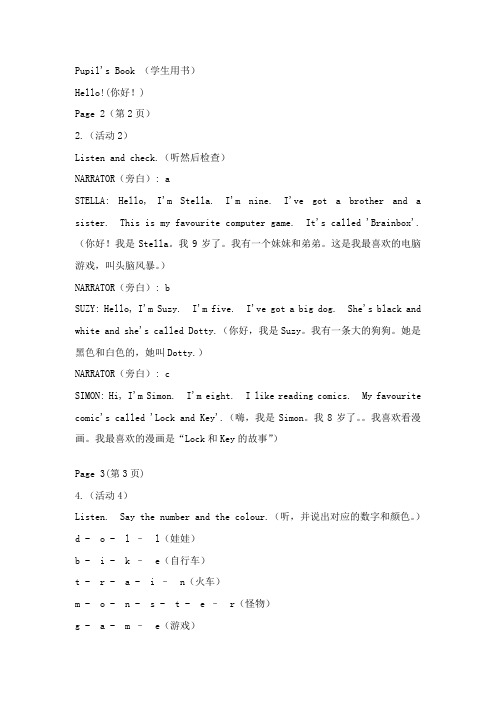
Pupil's Book (学生用书)Hello!(你好!)Page 2(第2页)2.(活动2)Listen and check.(听然后检查)NARRATOR(旁白): aSTELLA: Hello, I'm Stella. I'm nine. I've got a brother and a sister. This is my favourite computer game. It's called 'Brainbox'.(你好!我是Stella。
我9岁了。
我有一个妹妹和弟弟。
这是我最喜欢的电脑游戏,叫头脑风暴。
)NARRATOR(旁白): bSUZY: Hello, I'm Suzy. I'm five. I've got a big dog. She's black and white and she's called Dotty.(你好,我是Suzy。
我有一条大的狗狗。
她是黑色和白色的,她叫Dotty.)NARRATOR(旁白): cSIMON: Hi, I'm Simon. I'm eight. I like reading comics. My favourite comic's called 'Lock and Key'.(嗨,我是Simon。
我8岁了。
我喜欢看漫画。
我最喜欢的漫画是“Lock和Key的故事”)Page 3(第3页)4.(活动4)Listen. Say the number and the colour.(听,并说出对应的数字和颜色。
)d - o - l –l(娃娃)b - i - k –e(自行车)t - r - a - i –n(火车)m - o - n - s - t - e –r(怪物)g - a - m –e(游戏)c - o - m - p - u - t - e –r(电脑)k - i - t –e(风筝)c - a - m - e - r –a(照相机)l - o - r - r –y (货车)h - e - l - i - c - o - p - t - e - r(直升机)Page 4(第4页)7 Read and match the names.(活动7 读然后找出对应的人物。


人教版初一(下)英语第21讲:unit11词汇篇(学生版)(3)smile和laugh的区别:smile一般是无声的微笑;laugh一般是有声的笑、大笑,laugh at 是嘲笑。
2. each pron. 各个,每个◆ In the US some people shake hands, and some kiss or hug each other.在美国,有些人握手,有些人亲吻或彼此拥抱。
◆ He gave a book to each of his parents.他给他父母各送了一本书。
◆ He gave each boy an apple.他给每个男孩一个苹果。
【探究总结】each 形容词代词①each 和other构成相互代词each other, 相当于one another,而every不和other连用②each可指两个或两个以上中间的每一个,而every 只可指三个或三个以上中间的每一个,不能指两个中的每一个, 如可以说each of my eyes, 不可说every one of my eyesevery形容词①every和not连用构成不完全否定。
each不和not 连用②表示“每隔……”、“每……”,要用“every+基数词+复数名词”。
这种结构中的every不能用each替代3. hold v. (held) 握着;使不动◆ South Americans sometimes hold your arm when they talk to you. 南美人在和你谈话时,有时候会抓住你的胳膊。
◆John held a knife in his hand.约翰手里握着一把小刀。
【探究总结】hold的用法作及物动词用,意为“握着;使不动;举行;包含;容纳”,常构成短语:hold on意为“(打电话时)别挂断”;hold on to 意为“抓住不放;紧紧抓住” 。
4. It’s+形容词+to do sth. 做某事是……的◆In some places, it isn’t polite to look at people when you talk.在一些地方,当你说话的时候看着人是不礼貌的。

八下英语单词分类汇总Unit1 What’s the matter?1.matter n. 问题;事情2.stomachache n. 胃痛;腹痛3.foot n. 脚;足4.neck n. 颈;脖子5.stomach n. 胃;腹部6.throat n. 咽喉;喉咙7.fever n. 发烧8.rest n. 放松;休息9.cough n. 咳嗽10.X-ray n. X射线;X光11.toothache n. 牙痛12.headache n. 头痛13.break n. 间歇;休息14.passenger n. 乘客;旅客15.kilo n. 千克;公斤16.rock n. 岩石17.knife n. 刀18.blood n. 血19.importance n. 重要性;重要20.decision n. 决定;抉择21.spirit n. 勇气;意志22.death n. 死;死亡23.nurse n. 护士24.trouble n. 问题;苦恼25.bandage n. 绷带;用绷带包扎26.knee n. 膝;膝盖27.nosebleed n. 鼻出血28.situation n. 情况;状况29.send v. 邮寄,发送30.climber n. 登山者;攀登者31.risk n. 危险;风险;冒险32.accident n. (交通)事故;意外遭遇33.control n. 限制;约束;管理34. lie (lay) v. 躺;平躺35.rest v.& n. 放松;休息36.cough v. & n. 咳嗽37.hurt (hurt) v. (使)疼痛;受伤38.hit (hit) v. 击;打39.bandage v. 用绷带包扎n. 绷带40.breathe v. 呼吸41.risk v.& n. 危险;风险;冒险42.mean (meant) v. 意思是;打算;意欲43.control v.& n. 限制;约束;管理44.sore adj. 疼痛的;酸痛的45.sunburned adj. 晒伤的46.sick adj. 生病的;有病的47.off adv. 离开(某处);不工作;从......去掉48.herself pron. 她自己(she 的反身代词)49.ourselves pron. 我们自己(we 的反身代词)50. What’s the matter? 怎么了?出什么事了?51. have a cold 感冒52. have a stomachache 胃痛53. lie down 躺下54. take one’s temperature 量体温55. have a fever 发烧56. take breaks (take a break) 休息57. get off 下车58. to one’s surprise 使......惊讶的;出乎....意料60. right away 立即;马上61. get into 陷入;参与62. take risks 冒险63. give up 放弃64. be in control of 掌管;管理65. get out of 离开;从......出来66. run out (of) 用尽;耗尽67. be used to 习惯于......;适应于.....68. cut off 切除Unit 2 I’ll help to clean up the city parks.1. volunteer n. 志愿者2. sign n. 标志;信号3. notice n. 通知;通告;4. feeling n. 感觉;感触5. satisfaction n. 满足;,满意6. joy n. 高兴;愉快7. owner n. 物主;主人8. journey n. (长途)旅行;行程9. wheel n. 车轮;车子10. letter n. 信;函11. Miss n. 女士;小姐12. difficulty n. 困难;难题13. door n. 门14. training n. 训练;培训15. kindness n. 仁慈;善良16. change n. 变化;改变17. interest n. 兴趣;关注18. sir n. 先生(用于正式信函中对不知名~1~的男性收信人的称呼时)19. madam n. 夫人;女士(用于正式信函中对不知名的女性收信人的称呼时)21.cheer v. 欢呼;喝彩22.volunteer v. 义务做;自愿做n. 志愿者23.notice v. 注意到;意识到n. 通知;通告;注意24.raise v. 募集;征集25.repair v. 修理;修补26.fix v. 修理;安装27.imagine v. 想象;设想28.open v. 开;打开29.carry v. 拿;提;扛30.train v. 训练;培训31.understand (understood) v. 理解;领会32.change v.& n. 变化;改变33.interest v. 使感兴趣;使关注n. 兴趣;关注34. lonely adj. 孤独的;寂寞的35. broken adj. 破损的;残缺的36. disabled adj. 丧失能力的;有残疾的37. blind adj. 瞎的;失明的38. deaf adj. 聋的39 excited adj. 激动的;兴奋的40. clever adj. 聪明的;聪颖的41. strong adj. 强壮的42. alone adv. 独自;单独43.several pron. 几个;数个;一些44.1. clean up 打扫(或清除)干净45.2. cheer up (使)变得更高兴;振奋起来46.3. come up with 想出;提出(主意、计划回答等)47.4. put off 推迟48.5. hand out 分发49.6. call up 打电话给(某人);征召50.7. used to 曾经……;过去……51.8. care for 照顾,非常喜欢52.9. try out 参加……选拔;试用53.10. fix up 修理;装饰54.11 give away. 赠送;捐赠55.12. take after (外貌或行为)像56.13. set up 建起;设立57.14. make a difference 影响;有作用58.15 give out. 分发,散发Unit3 Could you please clean your room?1.rubbish n. 垃圾;废弃物2.floor n. 地板3.mess n. 杂乱;不整洁4.shirt n. 衬衫5.finger n. 手指6.chore n. 杂务;乏味无聊的工作7.snack n. 点心;小吃;快餐8.stress n. 精神压力;心理负担9.waste n. 浪费;垃圾;浪费;滥用10.independence n. 独立11.fairness n. 公正性;合理性12.neighbor n. 邻居13.fold v. 折叠;对折14.sweep (swept) v. 扫;打扫15.throw (threw) v. 仍;掷16.pass v. 给;递;走过;通过17.borrow v. 借;借用18.lend (lent) v. 借给;借出19.hate v. 厌恶;讨厌20.waste v. 浪费;滥用n. 浪费;垃圾21.provide v. 提供;供应22.depend v. 依靠;信赖23.develop v. 发展;壮大24.drop v. 落下;掉下25.ill adj. 有病;不舒服26.fair adj. 合理的;公正的27.unfair adj. 不合理的;不公正的28.independent adj. 独立的;自主的29.neither adv. 也不30.anyway adv. 而且;加之31.since adv. 从……以后;自……以来32.1. since prep. 从……以后;自……以来33.while conj. 与……同时;当……的时候;而;然而34.since conj. 因为;既然prep. & adv. 从……以后;自……以来35.take out the rubbish 倒垃圾36.all the time 频繁;反复37.as soon as 一……就……;尽快38.in order to 目的是;为了39.take care of 照顾;处理40.depend on 依靠,信赖Unit4 Why don’t you talk to your parents?1.midnight n. 午夜;子夜2.deal n. 协议;交易~2~3.relation n. 关系;联系;交往munication n. 交流;沟通5.cloud n. 云;云朵6.member n. 成员;分子7.pressure n. 压力8.opinion n. 意见;想法;看法9.skill n. 技艺;技巧10.football n. (美式)橄榄球;足球11.development n.发展;发育;成长12.allow v. 允许;准许13.guess v. 猜测;估计14.argue v. 争吵;争论15.offer v. 主动提出;自愿给予municate v. 交流;沟通17.explain v. 解释;说明18.copy v. 抄袭;模仿;复制;复印19.return v. 归还;回来;返回pete v. 竞争;对抗21.continue v. 持续;继续存在pare v. 比较23.push v. 鞭策;督促;推动24.cause v. 造成;引起25.wrong adj. 有毛病的;错误的26.elder adj. 年纪较长的27.nervous adj. 焦虑的;担忧的28.proper adj. 正确的;恰当的29.clear adj. 清楚易懂的;晴朗的30.typical adj. 典型的31.quick adj. 快的;迅速的;时间短暂的32.crazy adj. 不理智的;疯狂的ual adj. 通常的;寻常的34.instead adv. 代替;反而;却35.secondly adv. 第二;其次36.anymore adv. 再也(不);(不)再;(常用于否定句和疑问句末)37.perhaps adv. 可能,大概,也许38.whatever pron. 任何;每一39.look through 快速查看,浏览40.big deal 重要的事41.work out 成功的发展,解决42.get on with 和睦相处;关系良好43.cut out 删除;删去pare…with 比较;对比45.in one’s opinion 依……看Unit5 What were you doing whenthe rainstorm came?1.storm n. 暴风雨2.wind n. 风3.light n. 光;光线;光亮4.report n. 报道;公布5.area n. 地域;地区6.wood n. 木;木头7.window n. 窗;窗户8.flashlight n. 手电筒;火炬9.match n. 火柴10.passage n. 章节;段落11.pupil n. 学生12.silence n. 沉默;缄默;无声13.terrorist n. 恐怖主义者;恐怖分子14.date n. 日期;日子15.tower n. 塔;塔楼16.truth n. 实情;事实17.alarm n. 闹钟18.rainstorm n. 暴风雨19.alarm n. 闹钟20.begin (began) v. 开始21.report v.& n. 报道;公布22.beat v. 敲打;打败23.rise v.& n. 升起;增加;提高24.kid v. 开玩笑;欺骗25.realize v. 理解;领会;认识到26. strange adj. 奇特的;奇怪的27. asleep adj. 睡着28. fallen adj. 倒下的;落下的29. icy adj. 覆盖着冰的;冰冷的30. shocked adj. 惊愕的;受震惊的31.heavily adv. 在很大程度上;大量的32.suddenly adv. 突然;忽然33.apart adv. 分离;分开pletely adv. 彻底地;完全地35.recently adv. 不久前;最近36.against prep. 倚;碰;撞37.go off (闹钟)发出响声38.pick up 接电话39.fall asleep 进入梦乡40.die down 睡着逐渐变弱;逐渐消失41.have a look 看一看42.make one’s way 前往;费力的前进43.in silence 沉默;无声44.take down 拆除;往下拽;记录45.at first 首先;最初~3~Unit6 An old man tried to move the mountains.1.stone n. 石头2.god n. 神;上帝3.bit n. 一点;小块4.object n. 物体;物品5.tail n. 尾巴6.stick n. 棍;条7.stepsister n. 继姐(妹)8.prince n. 王子9.couple n. (尤指)夫妻;两人;两件事物10.smile n. 笑;微笑11.gold n. 金子;金币12.emperor n. 国王13.silk n. 丝绸;丝织物14.underwear n. 内衣15.nobody n. 小人物16.cheat n. 骗子17.stepmother n. 继母18.wife n. 妻子;太太19.wife n. 丈夫20.scene n. (戏剧或歌剧的)场;场景21.moonlight n. 月光22.ground n. 地;地面23.voice n. 声音24.shoot (shot) v. 射击;发射25.remind v. 提醒;使想起26.hide v. 隐藏;隐蔽27.excite v. 使激动;使兴奋28.fit v. 适合;合身29.smile v.& n. 笑;微笑30.marry v. 结婚31.cheat v. 欺骗;蒙骗n. 骗子32.shine (shone) v. 发光;照耀33.lead (led) v. 带路;领路34.weak adj. 虚弱的;无力的35.silly adj. 愚蠢的;不明事理的36.magic adj. 有魔力的;有神奇力量的37.Western adj. 西方国家的;(尤指)欧美的;西方的(w可以小写)38.gold adj. 金色的39.whole adj. 全部的;整体的40.bright adj. 明亮的;光线充足的41.brave adj. 勇敢的;无畏的42.stupid adj. 愚蠢的43.bright adv. 光亮地;明亮地;44.nobody pron. 没有人n. 小人物45.a little bit 有点;稍微46.tur n ...into 变成47.once upon 从前48.fall in love 爱上;喜欢上49.instead of 代替;反而50.get married 结婚Unit7 What’s the highest mountain in the world?1. square n. 平方;正方形2. meter n. 米;公尺3. desert n. 沙漠4. population n 人口;人口数量5. Asia n. 亚洲6. tour n. 旅行;旅游7. tourist n. 旅行者;观光者8. wall n. 墙9. achievement n. 成就;成绩10. condition n. 条件;状况11. challenge n. 挑战;考验12. force n. 力;力量13. nature n. 自然界;大自然14. ocean n. 大海;海洋15. birth n. 出生;诞生16. adult n. 成人;成年动物17. bamboo n. 竹子18. research n. 研究;调查(用作名词时,重音可放在第一个音节)19. keeper n. 饲养员;保管人20. excitement n. 激动;兴奋21. illness n. 疾病;病22. artwork n. 图片;插图23. government n. 政府;内阁24. whale n. 鲸25. oil n. 油;食用油;石油26. protection n. 保护;保卫27.tour v.& n. 旅行;旅游28.protect v. 保护;防护29.include v. 包括;包含30.succeed v. 实现目标;成功31.challenge v.& n. 挑战;考验32.achieve v. 达到;完成;成功33.weigh v. 重量是……;称……的重量34.research v.& n. 研究;调查35.deep adj. 深的;纵深的~4~36.amazing adj. 令人大为惊奇的;令人惊喜(或惊叹)的37.ancient adj. 古代的;古老的38.wide adj. 宽的;宽阔的39.southwestern adj. 西南的;西南方向的40.thick adj. 厚的;浓的41.freezing adj. 极冷的;冰冻的42.adult adj. 成年的;成人的;43.endangered adj. 濒危的44.awake adj. 醒着45.remaining adj. 遗留的;剩余的46.wild adj. 野生的47.huge adj. 巨大的;极多的48.feel free (可以)随便(做某事)49.as far as I know 就我所知50.take in 吸入;吞入(体内)51.in the face of 面对(问题、困难等)52.even though 即使;虽然53.at birth 出生时54.up to 到达(某数量、程度等);至多有;不多于55.walk into 走路时撞着56.fall over 绊倒57.or so 大约Unit8 Have you read Treasure Island yet?(23个)1.treasure n. 珠宝;财富2.island n. 岛3.classic n. 经典作品;名著4.page n. (书刊或纸张的)页,面,张5.ship n. 船6.tool n. 工具7.gun n. 枪;炮8.mark n. 迹象;记号;分数;9.sand n. 沙滩;沙10.cannibal n. 食人肉者nd n. 陆地;大地12.fiction n. 小说13.technology n. 科技;工艺14.French n. 法语15.pop n. 流行音乐;流行乐曲16.rock n. 摇滚乐17.band n. 乐队18.fan n. 迷;狂热爱好者19.success n. 成功ughter n. 笑;笑声21.beauty n. 美;美丽22.record n. 唱片;记录;录制;录(音)23.line n. 行;排24.hurry v. 匆忙;赶快25.mark v. 做记号;打分n. 迹象;记号;分数26.belong v. 属于;归属27.record v. 录制;录(音)n. 唱片;记录28.introduce v. 介绍;引见29.due adj. 预期;预订30.southern adj. 南方的31.modern adj. 现代的;当代的32.forever adv. 永远33.abroad adv. 在国外;到国外34.actually adv. 真实的;事实上35.1. million num. 一百万36.1. towards prep. 朝;向;对着37.full of 满是……的;(有)大量的;(有)丰富的38.hurry up 赶快;急忙(做某事)39.science fiction 科幻小说(或影片等)40.country music 乡村音乐41.one another 互相42.ever since 自从Unit9 Have you ever been to a museum?1. amusement n. 娱乐;游戏2.camera n. 照相机;摄影机;摄像机3.invention n. 发明;发明物4.progress n. 进步;进展5.toilet n. 座便器;厕所6.performance n. 表演;演出7.German n. 德语;德国人8.theme n. 主题9.ride n. 供乘骑的游乐设施;短途旅程10.province n. 省份11.fear n. 害怕;惧怕12.Indian n. 印度人13.Japanese n. 日本人;日语14.fox n. 狐狸15.equator n. 赤道16.spring n. 春天17.location n. 地点;位置18.invent v. 发明;创造19.progress v.& n. 进步;进展~5~20.encourage v. 鼓励21.collect v. 收集;采集22.fear v.& n. 害怕;惧怕23.unbelievable adj. 难以置信的;不真实的24.rapid adj. 迅速的;快速的25.unusual adj. 特别的;不寻常的26.social adj. 社会的27.peaceful adj. 和平的;安宁的28.perfect adj. 完美的;完全的29.German adj.德国的;德语的;德国人的30.safe adj. 安全的;无危险的31.Indian adj. 印度的;印度人32.Japanese adj.日本的;日本人的;日语的33.somewhere adv. 在某处;到某处34.simply adv. 仅仅;只;不过35.mostly adv. 主要地;通常36.thousand num. 一千37.itself pron. 它自己(it的反身代词)38.tea art 茶艺39.tea set 茶具40.a couple of 两个;一对;几个41.thousands of 数以千计的;许许多多的42.on the one hand … on the other hand …一方面……另一方面……43.all year round 全年44.amusement park 游乐场Unit10 I’ve had this bike for three years.1.yard n. 院子2.memory n. 记忆;回忆3.cent n. 分;分币4.toy n. 玩具5.bear n. 熊6.maker n. 生产者;制订者7.scarf n. 围巾;披巾;头巾8.check n. 检查;审查9.board n. 板;木板10.bedroom n. 卧室11.railway n. 铁路;铁道12.while n.一段时间;一会儿13.hometown n.家乡;故乡14.search n.搜索;搜查15.crayon n. 彩色铅笔(或粉笔、蜡笔)16.shame n.羞耻;羞愧;惭愧17.century n.百年;世纪18.childhood n.童年;幼年19.check v.& n. 检查;审查20.clear v. 清理;清除21.own v. 拥有;有22.part v. 离开;分开23.search v.& n. 搜索;搜查24.regard v. 将……认为;把……视为25.count v. 数数26.consider v. 注视;仔细考虑27.hold (held - held) v. 拥有;抓住28.sweet adj. 甜蜜的;甜的;含糖的29.soft adj. 软的;柔软的30.junior adj. 地位(或职位、级别)低下的31.certain adj. 某种;某事;某人32.honest adj. 诚实的;老实的33.truthful adj. 诚实的;真实的34.opposite adj. 对面的;另一边的35.nowadays adv. 现今;现在;目前36.especially adv. 尤其;特别;格外37.among prep. 在(其)中;……之一38.opposite prep. 与……相对;在……对面;对面的;另一边的39.yard sale 庭院拍卖会40.bread maker 面包机41.soft toy 软体玩具;布绒玩具42.check out 察看;观察43.board game 棋类游戏44.junior high school 初级中学45.clear out 清理;丢掉46.no longer 不再;不复47.part with 放弃;交出48.as for 至于;关于49.to be honest 说实在的50.close to 几乎;接近~6~。
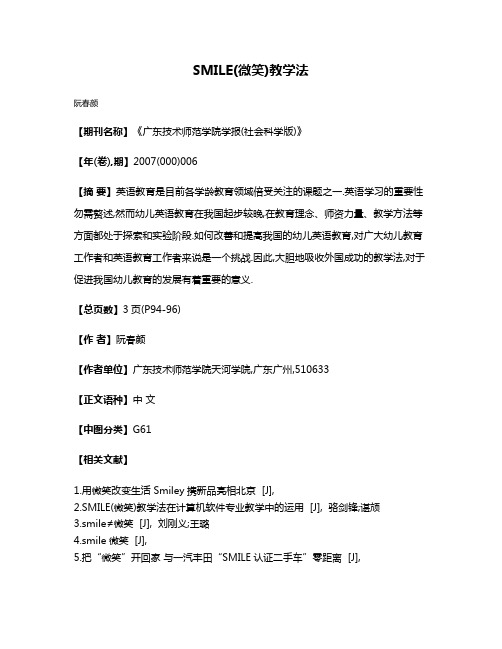
SMILE(微笑)教学法
阮春颜
【期刊名称】《广东技术师范学院学报(社会科学版)》
【年(卷),期】2007(000)006
【摘要】英语教育是目前各学龄教育领域倍受关注的课题之一.英语学习的重要性勿需赘述,然而幼儿英语教育在我国起步较晚,在教育理念、师资力量、教学方法等方面都处于探索和实验阶段.如何改善和提高我国的幼儿英语教育,对广大幼儿教育工作者和英语教育工作者来说是一个挑战.因此,大胆地吸收外国成功的教学法,对于促进我国幼儿教育的发展有着重要的意义.
【总页数】3页(P94-96)
【作者】阮春颜
【作者单位】广东技术师范学院天河学院,广东广州,510633
【正文语种】中文
【中图分类】G61
【相关文献】
1.用微笑改变生活 Smiley携新品亮相北京 [J],
2.SMILE(微笑)教学法在计算机软件专业教学中的运用 [J], 骆剑锋;谌颃
3.smile≠微笑 [J], 刘刚义;王璐
4.smile微笑 [J],
5.把“微笑”开回家与一汽丰田“SMILE认证二手车”零距离 [J],
因版权原因,仅展示原文概要,查看原文内容请购买。